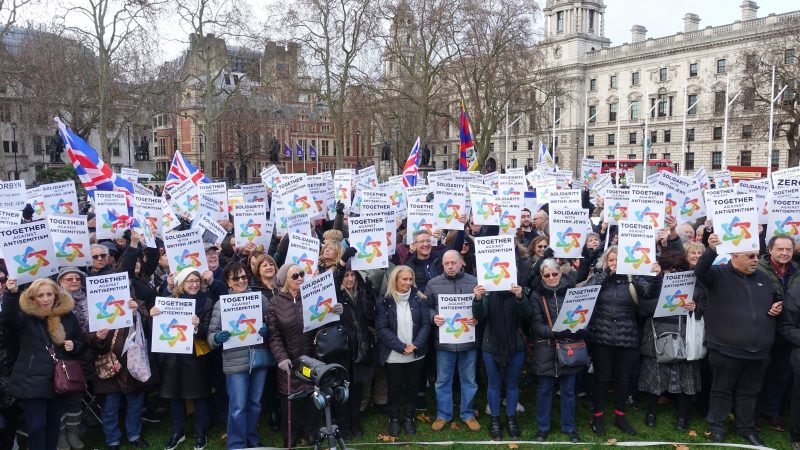
The final version of the Equality and Human Rights Commission report on allegations of antisemitism within Labour has been published following a formal investigation into the party that started in May 2019.
It has found that there were “unlawful acts of harassment and discrimination for which the Labour Party is responsible”, “serious failings in leadership and an inadequate process for handling antisemitism complaints”.
The EHRC has concluded that Labour is responsible for three breaches of the Equality Act (2010) relating to:
- Political interference in antisemitism complaints
- Failure to provide adequate training to those handling antisemitism complaints
- Harassment
The failure relating to political interference “mainly came from the opposition’s office”, the EHRC found, and this was “not a legitimate approach”. The interference applied to a third of the 70 case files reviewed.
The EHRC found that the failure to provide adequate training is not a currently unlawful finding because it has “not been possible” for Labour to implement this before publication of the report.
But the body has instructed the Labour Party to put in place practical and adequate training for those handling antisemitism complaints within six months of publication of the report today.
The report states that Labour “committed harassment against its members in relation to Jewish ethnicity” specifically in the cases of two individuals – former official Ken Livingstone and Pam Bromley.
The EHRC said Labour was responsible for Livingstone’s action as he was an agent of the party – a member of the national executive committee – and that his comments “had the effect of harassing Labour Party members”.
Bromley was a Labour councillor in Rossendale, thus an agent of the party and “Acting in the course of her authorised functions” when posting antisemitic comments on her Facebook account.
The EHRC says it saw email evidence that in February 2019, Governance and Legal Unit (GLU) staff were specifically instructed not to update any complainants on decisions in antisemitism cases.
Analysis of evidence by the body has also found that there was a “culture” within the Labour Party that “at best, did not do enough to prevent antisemitism and, at worst, could be seen to accept it”.
The Labour Party has been served with an unlawful act notice. The party has six weeks to produce an action plan in response to the findings and recommendations of the report published today.
The party now led by Keir Starmer has until December 10th to draft the action plan to implement the recommendations of the EHRC, and this is legally enforceable by the court if not fulfilled.
EHRC recommendations for the Labour Party include:
- Commission an independent process to handle and determine antisemitism complaints, as soon as rule changes allow.
- Implement clear rules and guidance that prohibit and sanction any inappropriate interference in the complaints process.
- Review and update its ‘Code of Conduct: Social Media Policy’ to make it clear that members may be investigated and subject to disciplinary action if they share or like any antisemitic social media content.
- Commission and provide education and practical training for all individuals involved in the antisemitism complaints process within six months.
CLICK TO READ THE REPORT
Commenting on the report publication, Campaign Against Antisemitism chief executive Gideon Falter said: “The Equality and Human Rights Commission’s report is a groundbreaking document.
“It is the first ever finding by the EHRC of unlawful acts. It heavily criticises the Labour Party’s former leadership. It makes clear recommendations to ensure that there is zero tolerance of antisemitism in the party in the future.
“It provides a robust framework for ensuring that the party complies. The EHRC’s report utterly vindicates Britain’s Jews who were accused of lying and exaggerating, acting as agents of another country and using their religion to ‘smear’ the Labour Party.”
The CAA has submitted complaints against Jeremy Corbyn, Diane Abbott and 15 other sitting MPs and “has given Labour six months to conduct transparent investigations and finally deliver justice for the Jewish community”.
After repeatedly complaining to Labour about Jeremy Corbyn but not finding that it would open an investigation, the Campaign Against Antisemitism formally referred the party to the EHRC in July 2018.
The EHRC decided that the threshold for a full statutory investigation had been met and launched a probe in May 2019 into whether Labour had “unlawfully discriminated against, harassed or victimised people because they are Jewish”.
It sought to determine “whether unlawful acts had been committed by the party, its employees or its agents”, and whether the party had “responded to complaints of unlawful acts in a lawful, efficient and effective manner”.
The Jewish Labour Movement made submissions including a document, leaked in a redacted form last year, that contained 70 testimonies from current and former party staffers and over 100 testimonies from members.
Labour confirmed in July 2020 that it had received the draft EHRC report. The party said it would not be commenting on the contents until the drafting process was completed, and Labour succeeded in preventing any leaks.
The EHRC was set up in 2007 under a Labour government. Section 20 of the Equality Act 2006 allows the body to carry out investigations in organisations suspected of committing unlawful discrimination.
During the statutory investigation, the EHRC was able to compel Labour to reveal details of its handling of antisemitism within the party including internal communications such as text messages and emails.




More from LabourList
‘Cutting Welsh university funding would be economic vandalism, not reform’
Sadiq Khan signals he will stand for a fourth term as London Mayor
Starmer or Sarwar: Scottish Labour MSPs and MPs split over Keir Starmer’s future